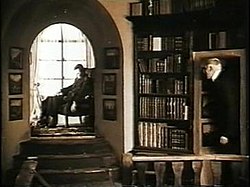Plot
“Devil's Field” is a cursed place, that scares the entire population of a small village of Silesia, because an ancestor of the family Rudenburg perished there victim of a mysterious explosion while digging a well in search of a buried treasure. Count von Rudenburg, current title holder, is also searching for the treasure, without result. He lives in his castle with his second wife, Helga, and a daughter from a first marriage, capricious Gerda.

Screenshot
In the nearby village, an old peasant, Rog, dies leaving two sons, Peter, very attached to the family land, and ambitious Johannes who thinks he is too good to live a peasant's life. He becomes secretary to Count von Rudenburg and starts courting his daughter. One day, he overhears that the Count has found an oilfield under Devil's Field. Shortly after, the Count, who is terminally ill, dictates him his will according to which his daughter Gerda will inherit his entire estate including all properties, manors and castles, while his second wife Helga will only inherit Devil's Field. Johannes then tells Helga she is the one he is in love with. He marries her after the Count's death.
Johannes goes to the city to discuss with a large company the exploitation of the oilfield. He refuses the sum of 25 million marks and convinces them to lend him the money so that he can exploit it himself. Meanwhile, his wife, desperate with his obsession with Devil's Field, sells the cursed land to Peter for twelve thousand marks. Johannes, furious, demands that she cancels the sales. Peter agrees, but the young woman, desperate that Johannes has never loved her, drowns herself in the river.
Gerda, who spitefully had got engaged to Baron von Lellewel is hoping to regain Johannes' love. But he tells her that he never loved either of the women and acted only by ambition. To avenge herself, Gerda sets fire to the rig that was installed on Devil's Field and dies in the ensuing explosion. Finally aware of the misfortunes he has caused, and of the vanity of his ambitions, Johannes returns to the farm where his brother and Maria, a country girl in love with him, had always been waiting for him. [2]
This page is based on this
Wikipedia article Text is available under the
CC BY-SA 4.0 license; additional terms may apply.
Images, videos and audio are available under their respective licenses.

